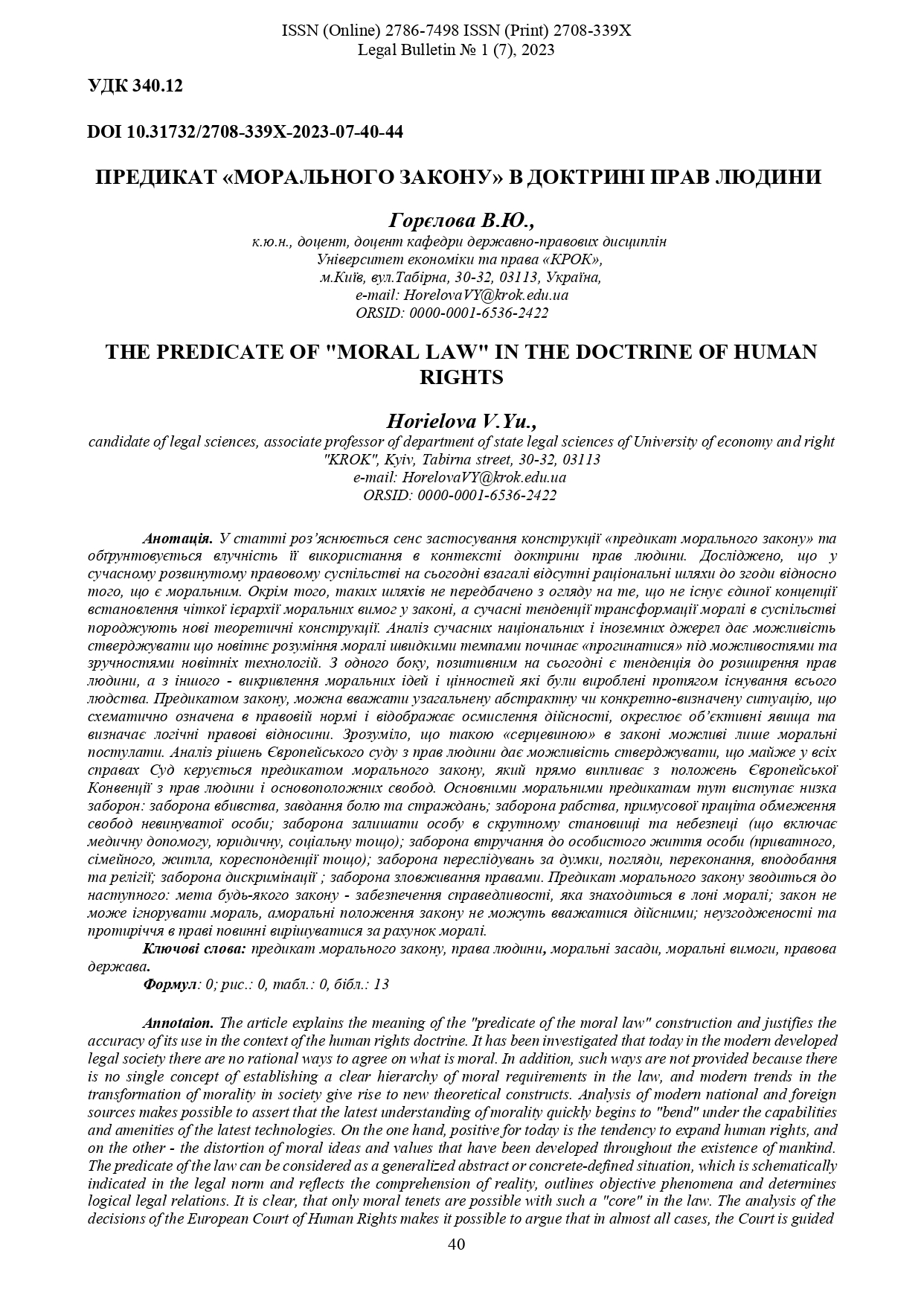THE PREDICATE OF "MORAL LAW" IN THE DOCTRINE OF HUMAN RIGHTS
DOI:
https://doi.org/10.31732/2708-33X-2023-07-40-44Keywords:
predicate of moral law, human rights, moral principles, moral requirements, legal state.Abstract
The article explains the meaning of the "predicate of the moral law" construction and justifies the accuracy of its use in the context of the human rights doctrine. It has been investigated that today in the modern developed legal society there are no rational ways to agree on what is moral. In addition, such ways are not provided because there is no single concept of establishing a clear hierarchy of moral requirements in the law, and modern trends in the transformation of morality in society give rise to new theoretical constructs. Analysis of modern national and foreign sources makes possible to assert that the latest understanding of morality quickly begins to "bend" under the capabilities and amenities of the latest technologies. On the one hand, positive for today is the tendency to expand human rights, and on the other - the distortion of moral ideas and values that have been developed throughout the existence of mankind. The predicate of the law can be considered as a generalized abstract or concrete-defined situation, which is schematically indicated in the legal norm and reflects the comprehension of reality, outlines objective phenomena and determines logical legal relations. It is clear, that only moral tenets are possible with such a "core" in the law. The analysis of the decisions of the European Court of Human Rights makes it possible to argue that in almost all cases, the Court is guided by the predicate of moral law, which directly follows from the provisions of the European Convention on Human Rights
and fundamental freedoms. The main moral predicates here are the number of prohibitions: the prohibition of murder, the task of pain and suffering; prohibition of slavery, forced labor and restriction of freedoms of an innocent person; prohibition to leave a person in difficulty and danger (including medical care, legal, social, etc.); prohibition of interference with the personal life of a person (private, family, housing, correspondence, etc.); prohibition of persecution for opinions, views, beliefs, preferences and religions; prohibition of discrimination; prohibition of abuse of rights. The predicate of moral law can be summarized as follows: the purpose of any law is to ensure justice, which resides within the realm of morality; the law cannot ignore morality, and amoral provisions of the law cannot be considered valid; inconsistencies and contradictions in the law must be resolved through morality.
References
V. Busel (2016). Ukrains`kiy tlumachniy slovnik [Ukrainian explanatory dictionary], Kyiv, Ukraine.
Vykhovanets, I. R Horodenska, K. H and Rusanivskyi V. M. (1983). Semantiko-sintksichna structura
rechennya [Semantic and syntactic structure of a sentence]. Kyiv, Ukraine.
Aristotle. (2020). Metaphizika [Metaphysics]. Andronum, Kyiv, Ukraine.
Vendler Z. (1967). Verbs and times. Linguistics in philosophy. Cornell University Press, pp. 97-121.
Kant I. (2020). Do vichnogo miru [Towards eternal peace]. Ripoll Classic, Kyiv, Ukraine.
Kant I. (2020). Osnovi metaphiziki morali [Foundations of the Metaphysics of Morality: A Collection of
Works], Andronum, Kyiv, Ukraine.
Anthony Khrapovitsky. (1892). The public good from a Christian perspective and from a contemporary
positive one. Theological Herald. Part. 2. Vol. 6. pp. 414-415
Author,Rawls J. (1993). Political Liberalism. New York: Columbia University Press.pp 161.
Author, Conor Gearty. (2010). Саn human rights survive? Cambridge university press.pp 174.
Author, Turyansky Yu. (2019). Human rights of the new generation: public morality and human dignity.
Public law. Vol 3 (35). pp 9-13.
Author, W.C. Starr. (1984). Law and morality in H.L.A. harts legal philosophy. California State University,
Los Angeles.pp 689.
Author, Pogge Thomas W. (2010). Is Kant’s Rechtslehre a «Comprehensive Liberalism?». The Southern
journal of philosophy.pp 133-158. Availaible at: https://www.researchgate.net/publication/229841734_Is_Kant's_Rechtslehre_Comprehensive (Accessed 20 February 2023).
Verkhovna Rada of Ukraine.(01.08.2021)The European Convention for the Protection of Human Rights and Fundamental Freedoms. Availaible at: https://zakon.rada.gov.ua/laws/show/995_004#Text (Accessed 20 February 2023).

Downloads
Published
How to Cite
Issue
Section
License
Copyright (c) 2023 Горєлова В.Ю.

This work is licensed under a Creative Commons Attribution 4.0 International License.




